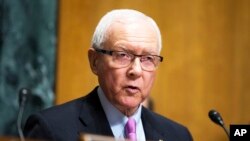A U.S. Senate panel approved legislation to facilitate the formation and approval of an ambitious Pacific region trade pact.
“This is truly a historic bill,” said Republican Senator Orrin Hatch of Utah, Finance Committee chairman. “U.S. trade with foreign countries is a good thing. We need to be tearing down barriers to American exports, while at the same time creating enforceable rules for our trading partners.”
By a vote of 20-6, the committee approved Trade Promotion Authority with bipartisan backing late Wednesday. TPA, also known as “fast track” authority, sets forth congressional goals and benchmarks when trade deals are negotiated, but, once completed, subjects them to up-or-down votes in both Republican-led chambers with no amendments allowed.
US, 11 other nations
TPA is viewed as critical for approving the Trans-Pacific Partnership involving the United States and 11 other nations that, combined, account for about 40-percent of the world’s gross domestic product. Initial negotiations began more than a decade ago and have been extended repeatedly as more nations came to the table.
U.S. lawmakers have been weighing in.
“Over the next decade and a half, the global middle class is going to balloon by more than 2 billion people, and they are going to be spending an awful lot of money,” said Senator Ron Wyden of Oregon, the Finance Committee’s top Democrat. “I want those billions of people to buy products designed and built by Oregonian and American workers, and get those workers high-wage, high-skilled jobs in a tough global economy.”
Others noted that Hatch and Wyden introduced TPA late last week and accused them of rushing to approve the bill without giving lawmakers adequate time to examine its many provisions and potential consequences.
“They want to fast-track this ‘fast-track’ legislation so they can pass more trade agreements that outsource jobs,” Ohio Democratic Senator Sherrod Brown said. “Trade done right can create jobs, but our current deals amount to corporate handouts and worker sell-outs.”
Opponents of TPA pointed to prior trade deals approved under “fast track,” like the North American Free Trade Agreement that went into effect more than 20 years ago with mixed economic results. While backing the expansion of trade as a general principle, President Barack Obama has said that previous deals did not always “live up to the hype.”
Wyden said current TPA legislation addresses prior shortcomings.
“The 1990s play book on trade has to go. Our trade policies in 2015 have got to work better for America’s middle class,” he said. “Our country is going to aim higher in trade agreements. Our trade enforcement will be much tougher, and the process of negotiating and voting on agreements will be more transparent, will be more open, more democratic.”
Full Senate debate
The bill now goes to the full Senate, where furious debate is expected.
“The answer is not only ‘no,’ but ‘hell no,’” said Senate Democratic Leader Harry Reid when asked about TPA.
Nationally, TPA pits powerful business interests eager to expand foreign markets for U.S. goods against labor groups worried about lost American jobs and what they see as lax labor, environmental and human rights standards in other Trans-Pacific Partnership nations.
The pact is being negotiated among Australia, Brunei, Canada, Chile, Japan, Malaysia, Mexico, New Zealand, Peru, Singapore, the United States and Vietnam.
U.S. Senate approval would have to overcome a likely procedural maneuver by opponents attempting block a vote. The so-called filibuster would likely delay but not prevent passage.
Approval in the House of Representatives is viewed as all but assured.









